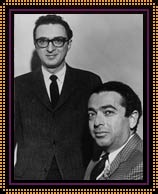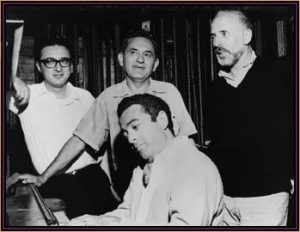 An important composer for the musical theater, Bock studied the piano from an early age and was soon able to play quite complicated compositions by ear. He wrote the music for various shows while studying at high school and the University of Wisconsin in the ’40s, and subsequently worked on revues at summer camps and for television. In 1955 Bock and lyricist Larry Holofcener contributed some songs to the Broadway revue “Catch a Star,” and a year later, with George Weiss, they provided the complete score for “Mr. Wonderful,” a musical vehicle for Sammy Davis Jr., which ran for 383 performances. Bock and Holofcener’s last assignment together was for the “Ziegfeld Follies of 1956,” which closed before it reached New York. Shortly afterward, Bock met lyricist Sheldon Harnick (b. April 30, 1924, Chicago, Illinois, USA), and they formed what is arguably the most important musical partnership of the ’60s. Harnick had been a dance band violinist before moving to New York in , where he had several of his songs performed in revues such as “New Faces of 1952” (“Boston Beguine”) and “Shoestring Revue.” Bock and Harnick’s first effort, “The Body Beautiful” (1958), was a failure, but “Fiorello!” (1959) ran for 795 performances.
An important composer for the musical theater, Bock studied the piano from an early age and was soon able to play quite complicated compositions by ear. He wrote the music for various shows while studying at high school and the University of Wisconsin in the ’40s, and subsequently worked on revues at summer camps and for television. In 1955 Bock and lyricist Larry Holofcener contributed some songs to the Broadway revue “Catch a Star,” and a year later, with George Weiss, they provided the complete score for “Mr. Wonderful,” a musical vehicle for Sammy Davis Jr., which ran for 383 performances. Bock and Holofcener’s last assignment together was for the “Ziegfeld Follies of 1956,” which closed before it reached New York. Shortly afterward, Bock met lyricist Sheldon Harnick (b. April 30, 1924, Chicago, Illinois, USA), and they formed what is arguably the most important musical partnership of the ’60s. Harnick had been a dance band violinist before moving to New York in , where he had several of his songs performed in revues such as “New Faces of 1952” (“Boston Beguine”) and “Shoestring Revue.” Bock and Harnick’s first effort, “The Body Beautiful” (1958), was a failure, but “Fiorello!” (1959) ran for 795 performances.

Sheldon Harnick, Joseph Stein, Jerry Bock, and Jerome Robbins.
Next came the underrated “Tenderloin” (1960), a humorous exposé of vice in New York with some good songs including “Little Old New York,” “The Picture of Happiness,” and “How the Money Changes Hands.” In 1963 the team wrote several numbers for the critically acclaimed marionette show “Man in the Moon,” and later in the same year, came up with what is considered to be their best score, for “She Loves Me.” With delightful songs such as “Will He Like Me?”, “Ice Cream,” “A Trip to the Library,” and “She Loves Me,” plus Broadway’s favorite ingénue, Barbara Cook, it warranted a longer stay than just 302 performances. Bock and Harnick’s next show clocked up more than 10 times that total in New York, and was a smash hit around the world. “Fiddler on the Roof” (1964), starring Zero Mostel, became one of the most cherished of all Broadway musicals, and gave the world of popular music (and Jewish functions of all kinds) hit songs such as “Matchmaker, Matchmaker,” “Sunrise, Sunset,” and the immortal “If I Was a Rich Man.” It proved impossible to follow, and for the remainder of the decade the composers worked on a variety of projects, including a Sherlock Holmes musical, “Baker Street,” “The Apple Tree,” which was based on stories by Mark Twain and others and ran for 463 performances, and “Her First Roman,” based on George Bernard Shaw’s play “Caesar and Cleopatra,” to which they contributed a few songs. After “The Rothschilds” (1970), which had a strong Jewish theme and was similar in a way to “Fiddler on the Roof,” Bock and Harnick ended their partnership.
They formed what is arguably the most important musical partnership of the ’60s.
Jerry Block and Sheldon Harnick
Key Shows
- "The Apple Tree"
- "Fiddler on The Roof"
- "Fiorello!"
- "The Rothschilds"
- "She Loves Me"
Related Artists
- George Abbott
- Barbara Cook
- Zero Mostel
- Harold Prince
- Jerome Robbins
Bock has been inactive for over 20 years, with no apparent musical work forthcoming. In 1971, Harnick gave his “observations on the fine art and craft of lyric writing” at a recital in the “Lyrics and Lyricists” series at the 92nd Street Y in New York, and since then his projects have included “Pinocchio” (1973) with music by Mary Rodgers, “Rex” (1976) with music by Richard Rodgers, and an English translation of the “Umbrellas of Cherbourg” with composer Michel Legrand for a 1979 off-Broadway production. In ’80s there was a projected musical, “Dragons,” that did not materialize, and in the ’90s Harnick collaborated with Joe Raposo on “A Wonderful Life,” and with Thomas Z. Shepard on “Love in Two Countries,” neither of which opened on Broadway following their out-of-town tryouts. In 1997, Harnick contributed the book to “Good Company: Songs That Made It From Shows That Didn’t.” Premiered in Stockbridge, Massachusetts, the score included such gems as “More Than You Know,” “Time on My Hands,” and “All the Things You Are.”
Source: Biographical information provided by MUZE. Excerpted from the ENCYCLOPEDIA OF POPULAR MUSIC, edited by Colin Larkin. © 2004 MUZE UK Ltd.
Photo credits: Photofest
 An important composer for the musical theater, Bock studied the piano from an early age and was soon able to play quite complicated compositions by ear. He wrote the music for various shows while studying at high school and the University of Wisconsin in the ’40s, and subsequently worked on revues at summer camps and for television. In 1955 Bock and lyricist Larry Holofcener contributed some songs to the Broadway revue “Catch a Star,” and a year later, with George Weiss, they provided the complete score for “Mr. Wonderful,” a musical vehicle for Sammy Davis Jr., which ran for 383 performances. Bock and Holofcener’s last assignment together was for the “Ziegfeld Follies of 1956,” which closed before it reached New York. Shortly afterward, Bock met lyricist Sheldon Harnick (b. April 30, 1924, Chicago, Illinois, USA), and they formed what is arguably the most important musical partnership of the ’60s. Harnick had been a dance band violinist before moving to New York in , where he had several of his songs performed in revues such as “New Faces of 1952” (“Boston Beguine”) and “Shoestring Revue.” Bock and Harnick’s first effort, “The Body Beautiful” (1958), was a failure, but “Fiorello!” (1959) ran for 795 performances.
An important composer for the musical theater, Bock studied the piano from an early age and was soon able to play quite complicated compositions by ear. He wrote the music for various shows while studying at high school and the University of Wisconsin in the ’40s, and subsequently worked on revues at summer camps and for television. In 1955 Bock and lyricist Larry Holofcener contributed some songs to the Broadway revue “Catch a Star,” and a year later, with George Weiss, they provided the complete score for “Mr. Wonderful,” a musical vehicle for Sammy Davis Jr., which ran for 383 performances. Bock and Holofcener’s last assignment together was for the “Ziegfeld Follies of 1956,” which closed before it reached New York. Shortly afterward, Bock met lyricist Sheldon Harnick (b. April 30, 1924, Chicago, Illinois, USA), and they formed what is arguably the most important musical partnership of the ’60s. Harnick had been a dance band violinist before moving to New York in , where he had several of his songs performed in revues such as “New Faces of 1952” (“Boston Beguine”) and “Shoestring Revue.” Bock and Harnick’s first effort, “The Body Beautiful” (1958), was a failure, but “Fiorello!” (1959) ran for 795 performances. 

